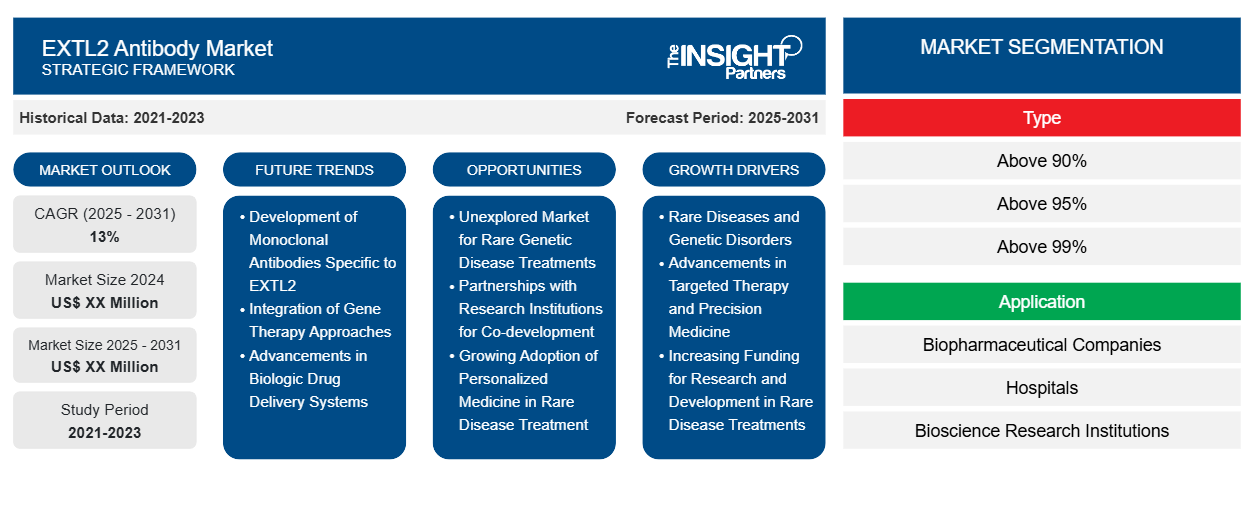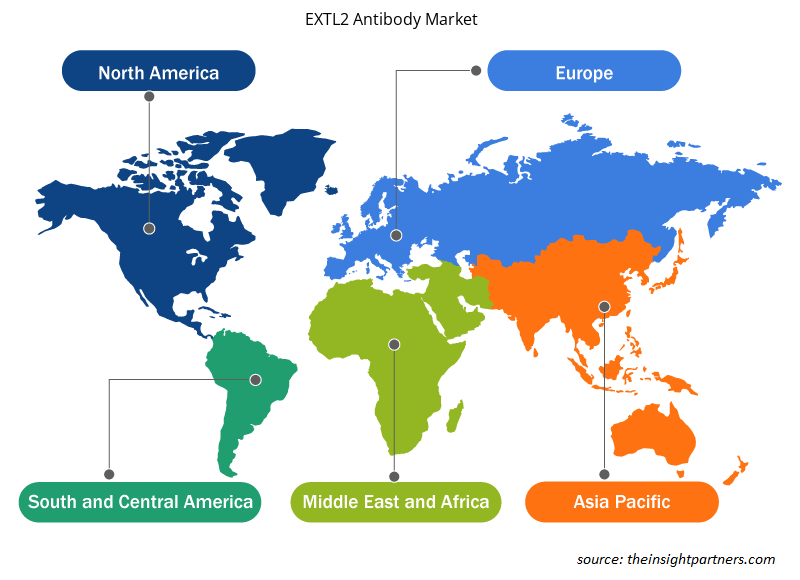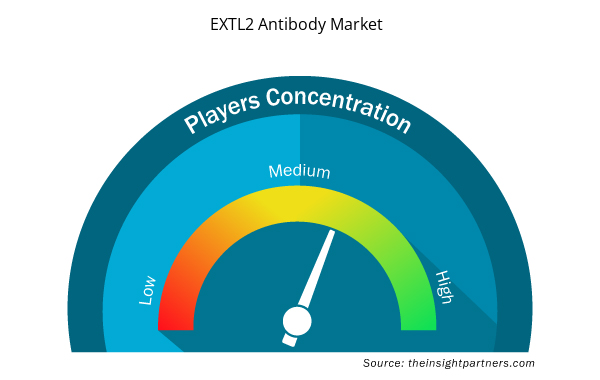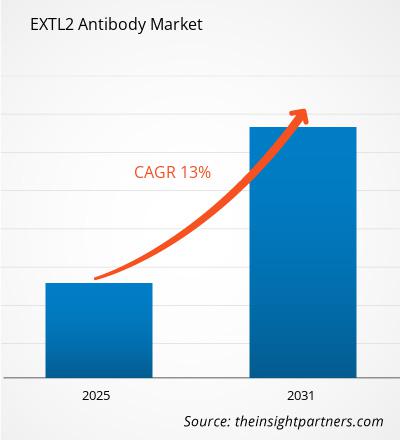The EXTL2 Antibody Market is expected to register a CAGR of 13% from 2025 to 2031, with a market size expanding from US$ XX Million in 2024 to US$ XX Million by 2031.
The research report on the EXTL2 Antibody Market is segmented by type into Above 90%, Above 95%, Above 99%, and Others. End-users include pharmaceutical companies, biotech firms, research institutions, and hospitals. The regional analysis covers key markets such as North America, Europe, Asia Pacific, the Middle East and Africa, and South America. The market evaluation is presented in US$ for all segmental analyses. This report delves into the growing demand for EXTL2 antibodies in scientific research and therapeutic applications, along with emerging trends in antibody development and their potential in treating rare diseases.
Purpose of the Report
The report EXTL2 Antibody Market by The Insight Partners aims to describe the present landscape and future growth, top driving factors, challenges, and opportunities. This will provide insights to various business stakeholders, such as:
- Technology Providers/Manufacturers: To understand the evolving market dynamics and know the potential growth opportunities, enabling them to make informed strategic decisions.
- Investors: To conduct a comprehensive trend analysis regarding the market growth rate, market financial projections, and opportunities that exist across the value chain.
- Regulatory bodies: To regulate policies and police activities in the market with the aim of minimizing abuse, preserving investor trust and confidence, and upholding the integrity and stability of the market.
EXTL2 Antibody Market Segmentation
Type
- Above 90%
- Above 95%
- Above 99%
Application
- Biopharmaceutical Companies
- Hospitals
- Bioscience Research Institutions
Customize This Report To Suit Your Requirement
You will get customization on any report - free of charge - including parts of this report, or country-level analysis, Excel Data pack, as well as avail great offers and discounts for start-ups & universities
EXTL2 Antibody Market: Strategic Insights

- Get Top Key Market Trends of this report.This FREE sample will include data analysis, ranging from market trends to estimates and forecasts.
EXTL2 Antibody Market Growth Drivers
- Rare Diseases and Genetic Disorders:
Exostosin-Like Glycosyltransferase 2 is a gene related to multiple rare diseases, such as multiple hereditary exostoses-a genetic disease characterized by benign bone tumors and abnormal growth of bones. Mutation in the ext1 or EXT2 genes causes MHE. EXTL2 is responsible for the biosynthesis of heparan sulfate, necessary for cartilage and bone development in organisms. The increasing recognition of the role of EXTL2 in genetic diseases has been followed by a growing interest in developing antibodies targeting this gene. As genetic disorders and rare diseases become more recognized and diagnosed globally, the demand for therapies targeting specific molecular pathways, such as EXTL2, is rising. According to NORD, there are about 7,000 rare diseases that affect millions of people worldwide, and this calls for specialized treatments, including the treatment of EXTL2.
- Advancements in Targeted Therapy and Precision Medicine:
Precision medicine has also contributed to a greater demand for more targeted therapies, such as EXTL2 antibodies. Precision medicine is treatment tailored to individual characteristics, such as genetic makeup. Targeted therapies that address the molecular abnormalities present in a patient's genetic profile are very popular. EXTL2 antibodies are those that specifically target the EXTL2 gene and the signaling pathways associated with it, which contribute to abnormal bone growth and tumor formation. They are a potential treatment for MHE and other related conditions. It continues to evolve further, and a growing emphasis of the field is on developing biologic therapies like monoclonal antibodies that are targeted at molecular levels to a specific disease mechanism, thus potentially improving efficacy over traditional treatments with fewer side effects.
- Increasing Funding for Research and Development in Rare Disease Treatments:
There is a significant upsurge in funding for research and development for rare diseases, including those diseases that are EXTL2 related. Pharmaceutical firms, academic organizations, and governments are investing increasingly in the production of therapies for diseases that often lack funding and under-served conditions. This can be illustrated by the Orphan Drug Act of the U.S. that offers much-needed incentives for developing drugs and treatment measures for rare diseases, which encourages more investments in such areas. Researchers are working to utilize the concept of monoclonal antibodies, especially those against EXTL2, to treat the actual cause of genetic disorders. This growing focus on rare diseases and genetic disorders is a key driver for the development of EXTL2-targeted therapies, which could offer a therapeutic solution for patients who have few other treatment options.
EXTL2 Antibody Market Future Trends
- Development of Monoclonal Antibodies Specific to EXTL2:
One of the most promising trends in the EXTL2 antibody market is the continued development of monoclonal antibodies specifically targeting EXTL2. Monoclonal antibodies have shown considerable success in treating various cancers and autoimmune diseases, and they are now being explored for their potential in treating genetic disorders such as those related to EXTL2 mutations. By targeting EXTL2 specifically, researchers hope to inhibit the abnormal signaling pathways that lead to bone growth abnormalities, particularly in MHE patients. Early-stage clinical trials have demonstrated that monoclonal antibodies targeting specific genetic mutations or molecular pathways can have high therapeutic potential with fewer side effects compared to traditional therapies. As more research is conducted in this area, the development of EXTL2-targeted monoclonal antibodies could revolutionize treatment options for patients with rare bone diseases and related genetic disorders.
- Integration of Gene Therapy Approaches: Gene therapy is emerging as a groundbreaking approach to treating genetic disorders, and it is increasingly being investigated as a complementary treatment alongside antibody-based therapies targeting EXTL2. Gene therapy offers the potential to correct the genetic mutations responsible for diseases such as MHE. By incorporating gene-editing technologies, such as CRISPR-Cas9, alongside EXTL2-targeted antibody therapies, researchers could potentially provide long-term or permanent solutions to these genetic disorders. This integration of gene therapy with EXTL2-targeted treatments could lead to more comprehensive approaches to treating rare genetic diseases, providing patients with better chances of recovery and long-term remission. As gene therapy technologies continue to advance, their integration into the EXTL2 antibody treatment landscape is likely to become a major trend in the coming years.
- Advancements in Biologic Drug Delivery Systems: One significant trend in the future of EXTL2 antibody treatment is the development of advanced drug delivery systems to improve the bioavailability and effectiveness of monoclonal antibodies. Conventional antibody therapies are often administered via intravenous infusion, which can be time-consuming and inconvenient for patients. Emerging biologic drug delivery systems, such as subcutaneous injections, nanoparticles, and targeted delivery systems, aim to enhance the efficacy of EXTL2 antibodies while making them easier to administer. For instance, nanoencapsulation technologies allow for more precise targeting of the affected tissues, potentially improving the effectiveness of the therapy and reducing side effects. This trend toward optimizing drug delivery systems for monoclonal antibodies will likely make EXTL2-targeted treatments more accessible and effective for patients, ultimately driving market growth.
EXTL2 Antibody Market Opportunities
- Unexplored Market for Rare Genetic Disease Treatments:
The market for the treatment of rare genetic diseases, especially EXTL2 mutation-induced diseases, is a massive opportunity for pharmaceutical companies. In fact, very few effective treatments are available to patients suffering from diseases such as multiple hereditary exostoses, which cause abnormal bone growth and tumors. Targeted therapies for EXTL2 could bridge this gap by providing patients with a more specific and effective treatment. Pharmaceutical companies focusing their efforts on drug development for such rare conditions benefit from regulatory incentives, including orphan drug designations, and can also be potential high-value therapies. With a growing awareness of rare diseases and better healthcare provision for such disorders, the demand for such therapies as EXTL2 antibodies continues to grow.
- Partnerships with Research Institutions for Co-development:
Partnerships between pharmaceutical companies and academic or research institutions hold huge opportunities in the development of EXTL2 antibody therapies. In this, such partnerships enable a pooling of resources, expertise, and clinical trial networks, accelerating the process for therapies against rare genetic diseases. Academic institutions are the spearheads of genetic research: they may discover new biomarkers or therapeutic targets from their work on the EXTL2 gene, which could then be used to develop treatments more effective in treating the diseases. By working together with research leaders, pharma can tap into cutting-edge scientific innovations to bring EXTL2-targeted therapies faster and more effectively to market and capture more space in the rare disease treatment space.
- Growing Adoption of Personalized Medicine in Rare Disease Treatment: Personalized medicine is gaining momentum in the treatment of rare diseases, where therapies are tailored to the individual patient’s genetic profile. EXTL2 antibody therapies have the potential to be a key component of this trend, offering highly specific treatments for individuals with mutations in the EXTL2 gene. This provides more efficient targeted treatments as opposed to one treatment for everyone in the event that patients can receive treatments that relate to their personal genetic mutation rather than just an all-purpose application. Integrating genetic testing and diagnostics in treating MHE as well as its related disorders leads to healthcare practitioners identifying appropriate therapy for these patients. As people embrace more customized medicine, more opportunities lie before companies working with EXTL2-targeted medicines.
EXTL2 Antibody Market Regional Insights
The regional trends and factors influencing the EXTL2 Antibody Market throughout the forecast period have been thoroughly explained by the analysts at Insight Partners. This section also discusses EXTL2 Antibody Market segments and geography across North America, Europe, Asia Pacific, Middle East and Africa, and South and Central America.

- Get the Regional Specific Data for EXTL2 Antibody Market
EXTL2 Antibody Market Report Scope
| Report Attribute | Details |
|---|---|
| Market size in 2024 | US$ XX Million |
| Market Size by 2031 | US$ XX Million |
| Global CAGR (2025 - 2031) | 13% |
| Historical Data | 2021-2023 |
| Forecast period | 2025-2031 |
| Segments Covered |
By Type
|
| Regions and Countries Covered | North America
|
| Market leaders and key company profiles |
EXTL2 Antibody Market Players Density: Understanding Its Impact on Business Dynamics
The EXTL2 Antibody Market market is growing rapidly, driven by increasing end-user demand due to factors such as evolving consumer preferences, technological advancements, and greater awareness of the product's benefits. As demand rises, businesses are expanding their offerings, innovating to meet consumer needs, and capitalizing on emerging trends, which further fuels market growth.
Market players density refers to the distribution of firms or companies operating within a particular market or industry. It indicates how many competitors (market players) are present in a given market space relative to its size or total market value.
Major Companies operating in the EXTL2 Antibody Market are:
- Atlas Antibodies(SE)
- Biosave(UK)
- BosterBio(US)
- Funakoshi(JP)
- Novus Biologicals(US)
- Proteintech(US)
Disclaimer: The companies listed above are not ranked in any particular order.

- Get the EXTL2 Antibody Market top key players overview
Key Selling Points
- Comprehensive Coverage: The report comprehensively covers the analysis of products, services, types, and end users of the EXTL2 Antibody Market, providing a holistic landscape.
- Expert Analysis: The report is compiled based on the in-depth understanding of industry experts and analysts.
- Up-to-date Information: The report assures business relevance due to its coverage of recent information and data trends.
- Customization Options: This report can be customized to cater to specific client requirements and suit the business strategies aptly.
The research report on the EXTL2 Antibody Market can, therefore, help spearhead the trail of decoding and understanding the industry scenario and growth prospects. Although there can be a few valid concerns, the overall benefits of this report tend to outweigh the disadvantages.
- Historical Analysis (2 Years), Base Year, Forecast (7 Years) with CAGR
- PEST and SWOT Analysis
- Market Size Value / Volume - Global, Regional, Country
- Industry and Competitive Landscape
- Excel Dataset


- MEMS Foundry Market
- Water Pipeline Leak Detection System Market
- Resistance Bands Market
- Aerosol Paints Market
- Dealer Management System Market
- E-Bike Market
- Digital Language Learning Market
- Asset Integrity Management Market
- Nuclear Waste Management System Market
- Artificial Intelligence in Defense Market

Report Coverage
Revenue forecast, Company Analysis, Industry landscape, Growth factors, and Trends

Segment Covered
This text is related
to segments covered.

Regional Scope
North America, Europe, Asia Pacific, Middle East & Africa, South & Central America

Country Scope
This text is related
to country scope.
Frequently Asked Questions
The EXTL2 Antibody Market is expected to register a CAGR of 13% from 2025-2031.
The growing recognition of EXTL2's role in genetic disorders, advancements in precision medicine, and increased funding for rare disease research are driving the development of targeted therapies, including EXTL2 antibodies.
Key Future Trends in the EXTL2 Antibody Market are- Development of Monoclonal Antibodies Specific to EXTL2 and Advancements in Biologic Drug Delivery Systems
Key companies in EXTL2 Antibody Market are - Atlas Antibodies(SE), Biosave(UK), BosterBio(US), Funakoshi(JP), Novus Biologicals(US), Proteintech(US), RandD Systems(US), RayBiotech, Inc.(US), Santa Cruz Biotechnology(US), Thermo Fisher Scientific(US)
The report can be delivered in PDF/PPT format; we can also share excel dataset based on the request.
Some of the customization options available based on request are additional 3–5 company profiles and country-specific analysis of 3–5 countries of your choice. Customizations are to be requested/discussed before making final order confirmation, as our team would review the same and check the feasibility.
Trends and growth analysis reports related to Life Sciences : READ MORE..
1. Atlas Antibodies(SE)
2. Biosave(UK)
3. BosterBio(US)
4. Funakoshi(JP)Novus Biologicals(US)
5. Proteintech(US)
6. RandD Systems(US)
7. RayBiotech, Inc.(US)
8. Santa Cruz Biotechnology(US)
9. Thermo Fisher Scientific(US)

 Get Free Sample For
Get Free Sample For